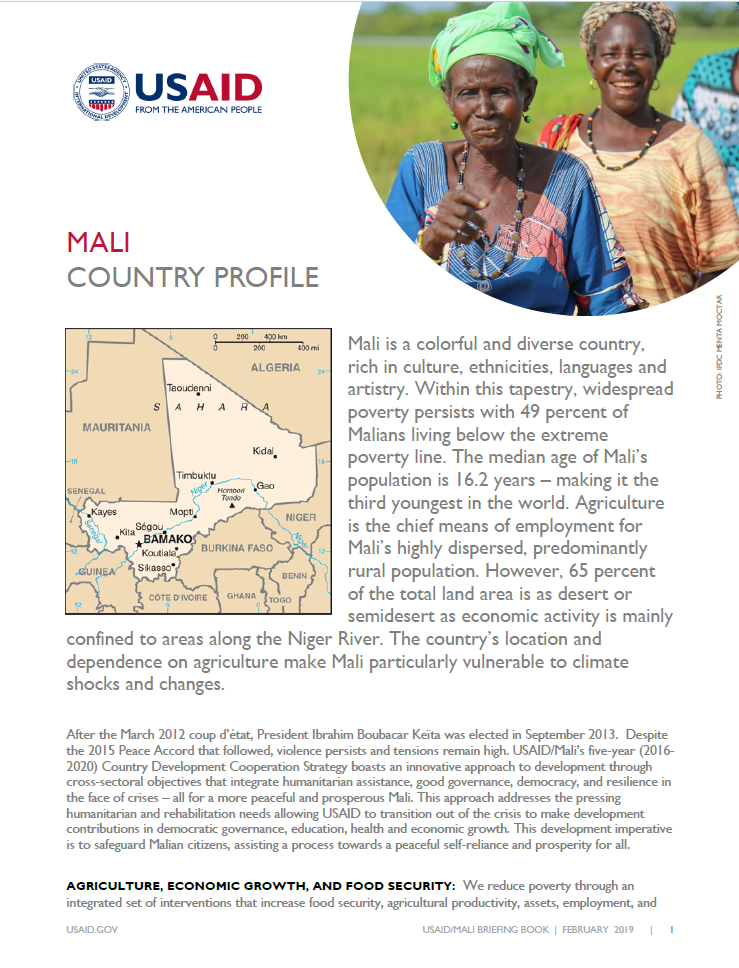Speeches Shim
Mali Country Profile ![]() (pdf - 301k)
(pdf - 301k)
Mali is a colorful and diverse country, rich in culture, ethnicities, languages and artistry. Within this tapestry, widespread poverty persists with 49 percent of Malians living below the extreme poverty line. The median age of Mali’s population is 16.2 years – making it the third youngest in the world. Agriculture is the chief means of employment for Mali’s highly dispersed, predominantly rural population. However, 65 percent of the total land area is as desert or semidesert as economic activity is mainly confined to areas along the Niger River. The country’s location and dependence on agriculture make Mali particularly vulnerable to climate shocks and changes.
After the March 2012 coup d’état, President Ibrahim Boubacar Keïta was elected in September 2013. Despite the 2015 Peace Accord that followed, violence persists and tensions remain high. USAID/Mali’s five-year (20162020) Country Development Cooperation Strategy boasts an innovative approach to development through cross-sectoral objectives that integrate humanitarian assistance, good governance, democracy, and resilience in the face of crises – all for a more peaceful and prosperous Mali. This approach addresses the pressing humanitarian and rehabilitation needs allowing USAID to transition out of the crisis to make development contributions in democratic governance, education, health and economic growth. This development imperative is to safeguard Malian citizens, assisting a process towards a peaceful self-reliance and prosperity for all.
AGRICULTURE, ECONOMIC GROWTH, AND FOOD SECURITY:
We reduce poverty through an integrated set of interventions that increase food security, agricultural productivity, assets, employment, and incomes. The Feed the Future Initiative invests in the value chains of two core sectors, chosen for their roles in food security, nutrition, and poverty reduction: cereals (millet, sorghum, rice), and livestock (cattle, sheep, goats), while highlighting the links between markets, nutrition, and dietary diversity. Additional programs focus on building the capacity of the private sector to meet Mali’s development needs, through improved credit access, public-private partnerships, and investment facilitation. KEY 2018 RESULT: Through USAID assistance, more than 404,000 Malian farmers have applied improved technologies or management practices.
DEMOCRACY, HUMAN RIGHTS, AND GOVERNANCE:
Our program is centered on public accountability with the goal of increasing public trust in government, and targets four democracy, human rights and governance sub-sectors: good governance; rule of law and human rights; civil society; and conflict mitigation. Through USAID support, Mali’s citizens will be better connected to their governance and justice sector institutions and civil society will play a greater oversight role in the ongoing reform process. KEY 2018 RESULT: USAID civic education activities reached over 5.2 million Malians to strengthen their civic participation.
ENVIRONMENT AND CLIMATE CHANGE:
Most Malians are engaged in subsistence agriculture, and developing resilience to climate change is integral to their livelihood. Sound environmental management is essential to reduce the risks associated with climatic events. The Global Climate Change Initiative in Mali addresses pressing climate adaptation issues through improved natural resource management and enhanced agronomic practices. KEY 2018 RESULT: Over 680,000 Malians can use climate information to improve resilience to climate change.
EDUCATION:
We work with the Ministry of Education to expand access to quality basic education by improving early grade reading competencies and providing life skills, vocational, and peacebuilding education to out-of-school children and youth. Special emphasis is placed on post-conflict programming aimed at re-opening schools, targeting marginalized groups including girls and young women, and increasing inclusive access to children with disabilities. KEY 2018 RESULT: Our programs helped educate 56,720 children and learners in primary schools and equivalent non-school based settings.
GLOBAL HEALTH:
USAID supports the nationwide expansion and scale-up of life-saving, high impact health interventions in public and private health facilities in the areas of maternal and child health; malaria prevention and control; family planning; water and sanitation; nutrition; and HIV/AIDS prevention. USAID also provides technical assistance, commodities and equipment to Mali’s primary health care delivery system and the community health worker program. KEY 2018 RESULT: The preliminary results of the 2018 Demographic and Health Survey show a huge decrease 19% of malaria prevalence in Mali. This is due to PMI investment in area of Malaria prevention and treatment in Mali.
HUMANITARIAN ASSISTANCE, CRISIS AND CONFLICT MANAGEMENT:
We provide critical programs that offer essential humanitarian assistance, conflict mitigation, and build the resilience of vulnerable communities and people in areas of recurrent crises and extreme poverty. Activities are underway to provide basic health and nutrition services, food assistance and to build more stable communities, create and diversify economic opportunities, and reduce tensions that could be exploited by terrorists or insurgents. KEY 2018 RESULT: Food and nutrition assistance reached 293,000 vulnerable Malians in conflict regions.


Comment
Make a general inquiry or suggest an improvement.